Foreign Policy Analysis: Geopolitical Perspectives in Australia
VerifiedAdded on 2022/08/23
|14
|4118
|22
Report
AI Summary
This report analyzes Australia's foreign policy through a geopolitical lens, examining the interplay between international relations theories and practical strategies. It explores how geopolitical factors and theories like realism, Marxism, liberalism, and constructivism shape Australia's foreign policy decisions and its interactions with other nations. The report highlights Australia's strategic approaches, including international treaties, trade agreements, and military capabilities, while also delving into the country's cultural diplomacy and geopolitical identity. It discusses how Australia leverages its cultural heritage and diplomatic presence to foster international relations. The analysis underscores the importance of understanding geopolitical perspectives to comprehend Australia's role in global affairs and its commitment to peace and harmony.
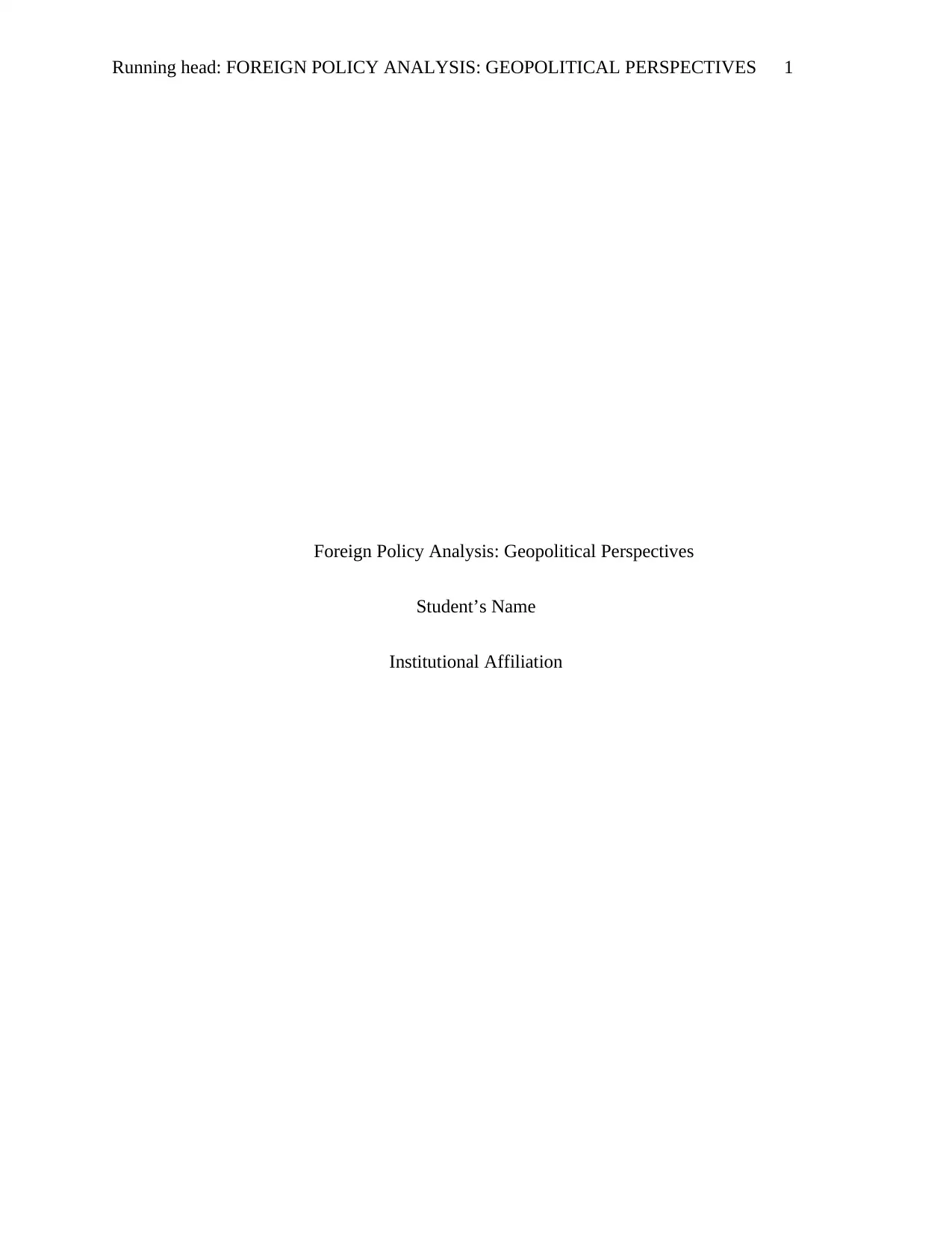
Running head: FOREIGN POLICY ANALYSIS: GEOPOLITICAL PERSPECTIVES 1
Foreign Policy Analysis: Geopolitical Perspectives
Student’s Name
Institutional Affiliation
Foreign Policy Analysis: Geopolitical Perspectives
Student’s Name
Institutional Affiliation
Paraphrase This Document
Need a fresh take? Get an instant paraphrase of this document with our AI Paraphraser
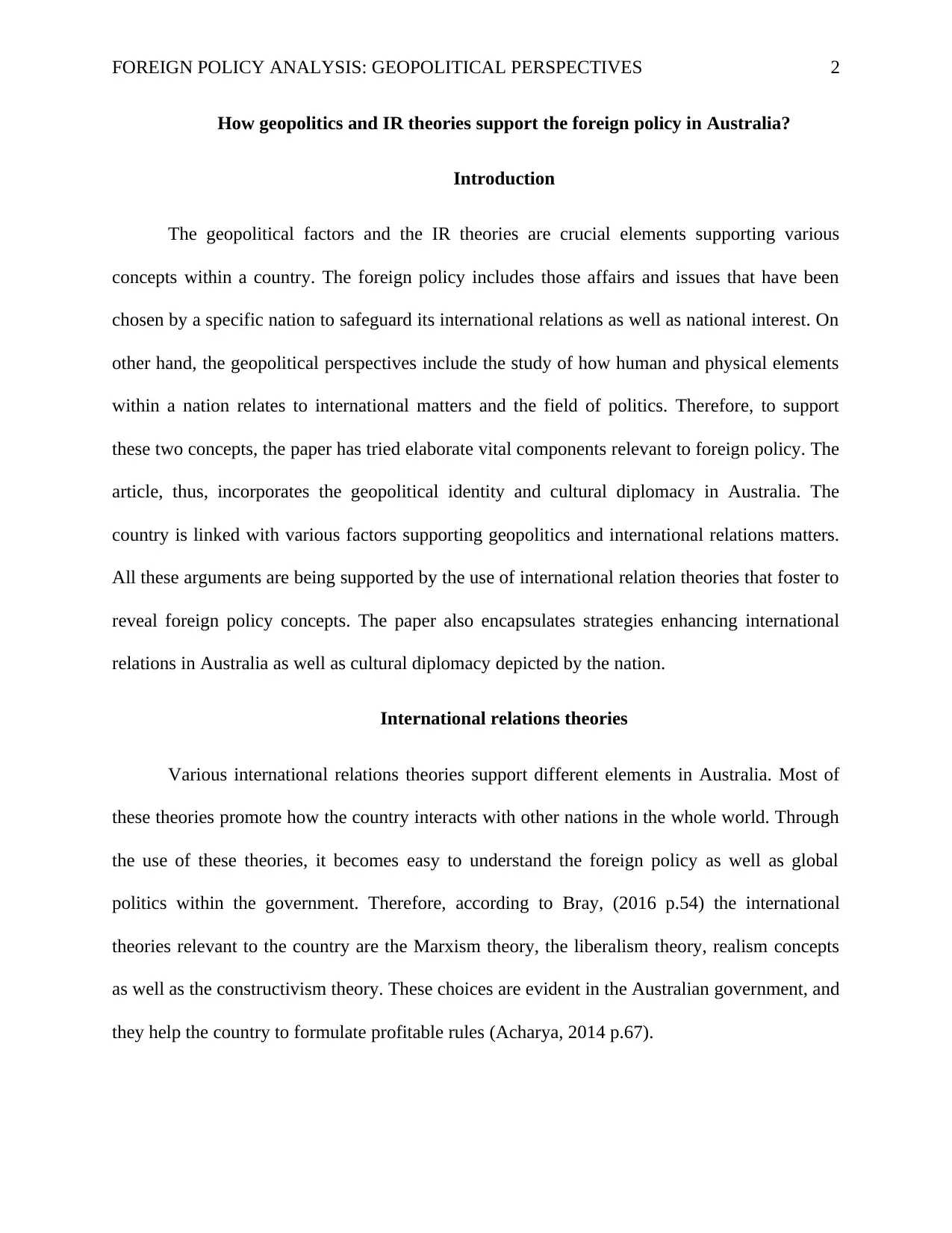
FOREIGN POLICY ANALYSIS: GEOPOLITICAL PERSPECTIVES 2
How geopolitics and IR theories support the foreign policy in Australia?
Introduction
The geopolitical factors and the IR theories are crucial elements supporting various
concepts within a country. The foreign policy includes those affairs and issues that have been
chosen by a specific nation to safeguard its international relations as well as national interest. On
other hand, the geopolitical perspectives include the study of how human and physical elements
within a nation relates to international matters and the field of politics. Therefore, to support
these two concepts, the paper has tried elaborate vital components relevant to foreign policy. The
article, thus, incorporates the geopolitical identity and cultural diplomacy in Australia. The
country is linked with various factors supporting geopolitics and international relations matters.
All these arguments are being supported by the use of international relation theories that foster to
reveal foreign policy concepts. The paper also encapsulates strategies enhancing international
relations in Australia as well as cultural diplomacy depicted by the nation.
International relations theories
Various international relations theories support different elements in Australia. Most of
these theories promote how the country interacts with other nations in the whole world. Through
the use of these theories, it becomes easy to understand the foreign policy as well as global
politics within the government. Therefore, according to Bray, (2016 p.54) the international
theories relevant to the country are the Marxism theory, the liberalism theory, realism concepts
as well as the constructivism theory. These choices are evident in the Australian government, and
they help the country to formulate profitable rules (Acharya, 2014 p.67).
How geopolitics and IR theories support the foreign policy in Australia?
Introduction
The geopolitical factors and the IR theories are crucial elements supporting various
concepts within a country. The foreign policy includes those affairs and issues that have been
chosen by a specific nation to safeguard its international relations as well as national interest. On
other hand, the geopolitical perspectives include the study of how human and physical elements
within a nation relates to international matters and the field of politics. Therefore, to support
these two concepts, the paper has tried elaborate vital components relevant to foreign policy. The
article, thus, incorporates the geopolitical identity and cultural diplomacy in Australia. The
country is linked with various factors supporting geopolitics and international relations matters.
All these arguments are being supported by the use of international relation theories that foster to
reveal foreign policy concepts. The paper also encapsulates strategies enhancing international
relations in Australia as well as cultural diplomacy depicted by the nation.
International relations theories
Various international relations theories support different elements in Australia. Most of
these theories promote how the country interacts with other nations in the whole world. Through
the use of these theories, it becomes easy to understand the foreign policy as well as global
politics within the government. Therefore, according to Bray, (2016 p.54) the international
theories relevant to the country are the Marxism theory, the liberalism theory, realism concepts
as well as the constructivism theory. These choices are evident in the Australian government, and
they help the country to formulate profitable rules (Acharya, 2014 p.67).
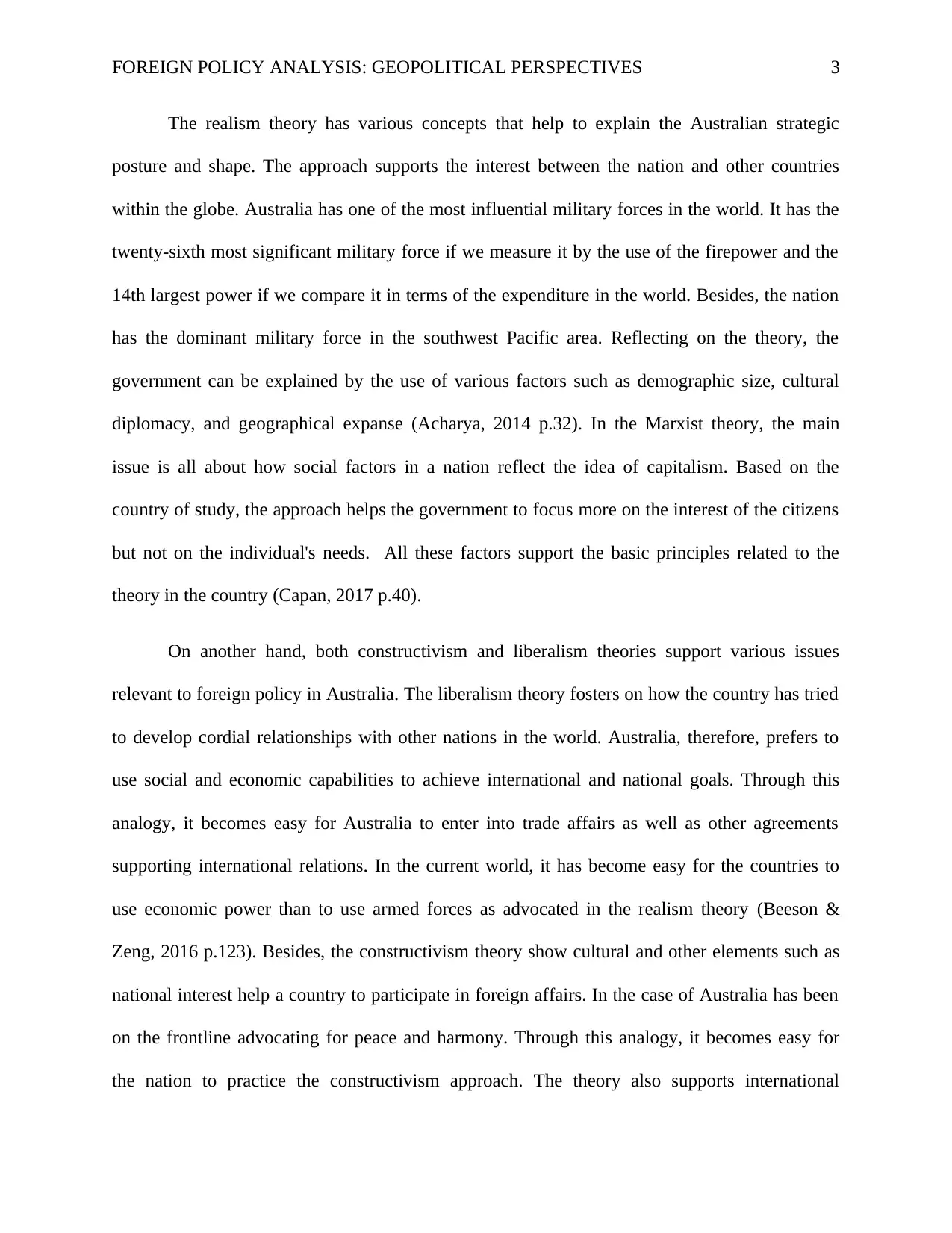
FOREIGN POLICY ANALYSIS: GEOPOLITICAL PERSPECTIVES 3
The realism theory has various concepts that help to explain the Australian strategic
posture and shape. The approach supports the interest between the nation and other countries
within the globe. Australia has one of the most influential military forces in the world. It has the
twenty-sixth most significant military force if we measure it by the use of the firepower and the
14th largest power if we compare it in terms of the expenditure in the world. Besides, the nation
has the dominant military force in the southwest Pacific area. Reflecting on the theory, the
government can be explained by the use of various factors such as demographic size, cultural
diplomacy, and geographical expanse (Acharya, 2014 p.32). In the Marxist theory, the main
issue is all about how social factors in a nation reflect the idea of capitalism. Based on the
country of study, the approach helps the government to focus more on the interest of the citizens
but not on the individual's needs. All these factors support the basic principles related to the
theory in the country (Capan, 2017 p.40).
On another hand, both constructivism and liberalism theories support various issues
relevant to foreign policy in Australia. The liberalism theory fosters on how the country has tried
to develop cordial relationships with other nations in the world. Australia, therefore, prefers to
use social and economic capabilities to achieve international and national goals. Through this
analogy, it becomes easy for Australia to enter into trade affairs as well as other agreements
supporting international relations. In the current world, it has become easy for the countries to
use economic power than to use armed forces as advocated in the realism theory (Beeson &
Zeng, 2016 p.123). Besides, the constructivism theory show cultural and other elements such as
national interest help a country to participate in foreign affairs. In the case of Australia has been
on the frontline advocating for peace and harmony. Through this analogy, it becomes easy for
the nation to practice the constructivism approach. The theory also supports international
The realism theory has various concepts that help to explain the Australian strategic
posture and shape. The approach supports the interest between the nation and other countries
within the globe. Australia has one of the most influential military forces in the world. It has the
twenty-sixth most significant military force if we measure it by the use of the firepower and the
14th largest power if we compare it in terms of the expenditure in the world. Besides, the nation
has the dominant military force in the southwest Pacific area. Reflecting on the theory, the
government can be explained by the use of various factors such as demographic size, cultural
diplomacy, and geographical expanse (Acharya, 2014 p.32). In the Marxist theory, the main
issue is all about how social factors in a nation reflect the idea of capitalism. Based on the
country of study, the approach helps the government to focus more on the interest of the citizens
but not on the individual's needs. All these factors support the basic principles related to the
theory in the country (Capan, 2017 p.40).
On another hand, both constructivism and liberalism theories support various issues
relevant to foreign policy in Australia. The liberalism theory fosters on how the country has tried
to develop cordial relationships with other nations in the world. Australia, therefore, prefers to
use social and economic capabilities to achieve international and national goals. Through this
analogy, it becomes easy for Australia to enter into trade affairs as well as other agreements
supporting international relations. In the current world, it has become easy for the countries to
use economic power than to use armed forces as advocated in the realism theory (Beeson &
Zeng, 2016 p.123). Besides, the constructivism theory show cultural and other elements such as
national interest help a country to participate in foreign affairs. In the case of Australia has been
on the frontline advocating for peace and harmony. Through this analogy, it becomes easy for
the nation to practice the constructivism approach. The theory also supports international
⊘ This is a preview!⊘
Do you want full access?
Subscribe today to unlock all pages.

Trusted by 1+ million students worldwide
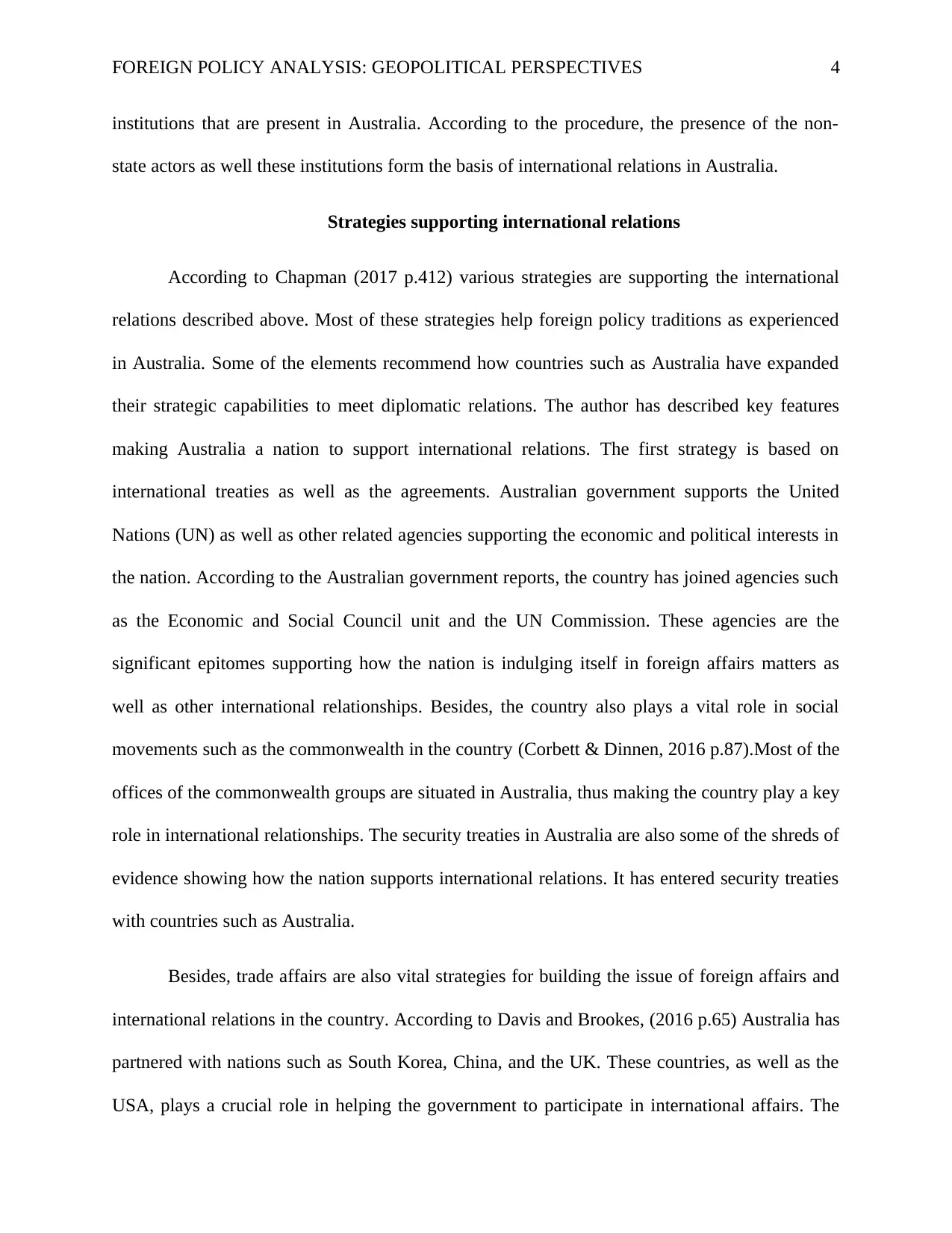
FOREIGN POLICY ANALYSIS: GEOPOLITICAL PERSPECTIVES 4
institutions that are present in Australia. According to the procedure, the presence of the non-
state actors as well these institutions form the basis of international relations in Australia.
Strategies supporting international relations
According to Chapman (2017 p.412) various strategies are supporting the international
relations described above. Most of these strategies help foreign policy traditions as experienced
in Australia. Some of the elements recommend how countries such as Australia have expanded
their strategic capabilities to meet diplomatic relations. The author has described key features
making Australia a nation to support international relations. The first strategy is based on
international treaties as well as the agreements. Australian government supports the United
Nations (UN) as well as other related agencies supporting the economic and political interests in
the nation. According to the Australian government reports, the country has joined agencies such
as the Economic and Social Council unit and the UN Commission. These agencies are the
significant epitomes supporting how the nation is indulging itself in foreign affairs matters as
well as other international relationships. Besides, the country also plays a vital role in social
movements such as the commonwealth in the country (Corbett & Dinnen, 2016 p.87).Most of the
offices of the commonwealth groups are situated in Australia, thus making the country play a key
role in international relationships. The security treaties in Australia are also some of the shreds of
evidence showing how the nation supports international relations. It has entered security treaties
with countries such as Australia.
Besides, trade affairs are also vital strategies for building the issue of foreign affairs and
international relations in the country. According to Davis and Brookes, (2016 p.65) Australia has
partnered with nations such as South Korea, China, and the UK. These countries, as well as the
USA, plays a crucial role in helping the government to participate in international affairs. The
institutions that are present in Australia. According to the procedure, the presence of the non-
state actors as well these institutions form the basis of international relations in Australia.
Strategies supporting international relations
According to Chapman (2017 p.412) various strategies are supporting the international
relations described above. Most of these strategies help foreign policy traditions as experienced
in Australia. Some of the elements recommend how countries such as Australia have expanded
their strategic capabilities to meet diplomatic relations. The author has described key features
making Australia a nation to support international relations. The first strategy is based on
international treaties as well as the agreements. Australian government supports the United
Nations (UN) as well as other related agencies supporting the economic and political interests in
the nation. According to the Australian government reports, the country has joined agencies such
as the Economic and Social Council unit and the UN Commission. These agencies are the
significant epitomes supporting how the nation is indulging itself in foreign affairs matters as
well as other international relationships. Besides, the country also plays a vital role in social
movements such as the commonwealth in the country (Corbett & Dinnen, 2016 p.87).Most of the
offices of the commonwealth groups are situated in Australia, thus making the country play a key
role in international relationships. The security treaties in Australia are also some of the shreds of
evidence showing how the nation supports international relations. It has entered security treaties
with countries such as Australia.
Besides, trade affairs are also vital strategies for building the issue of foreign affairs and
international relations in the country. According to Davis and Brookes, (2016 p.65) Australia has
partnered with nations such as South Korea, China, and the UK. These countries, as well as the
USA, plays a crucial role in helping the government to participate in international affairs. The
Paraphrase This Document
Need a fresh take? Get an instant paraphrase of this document with our AI Paraphraser
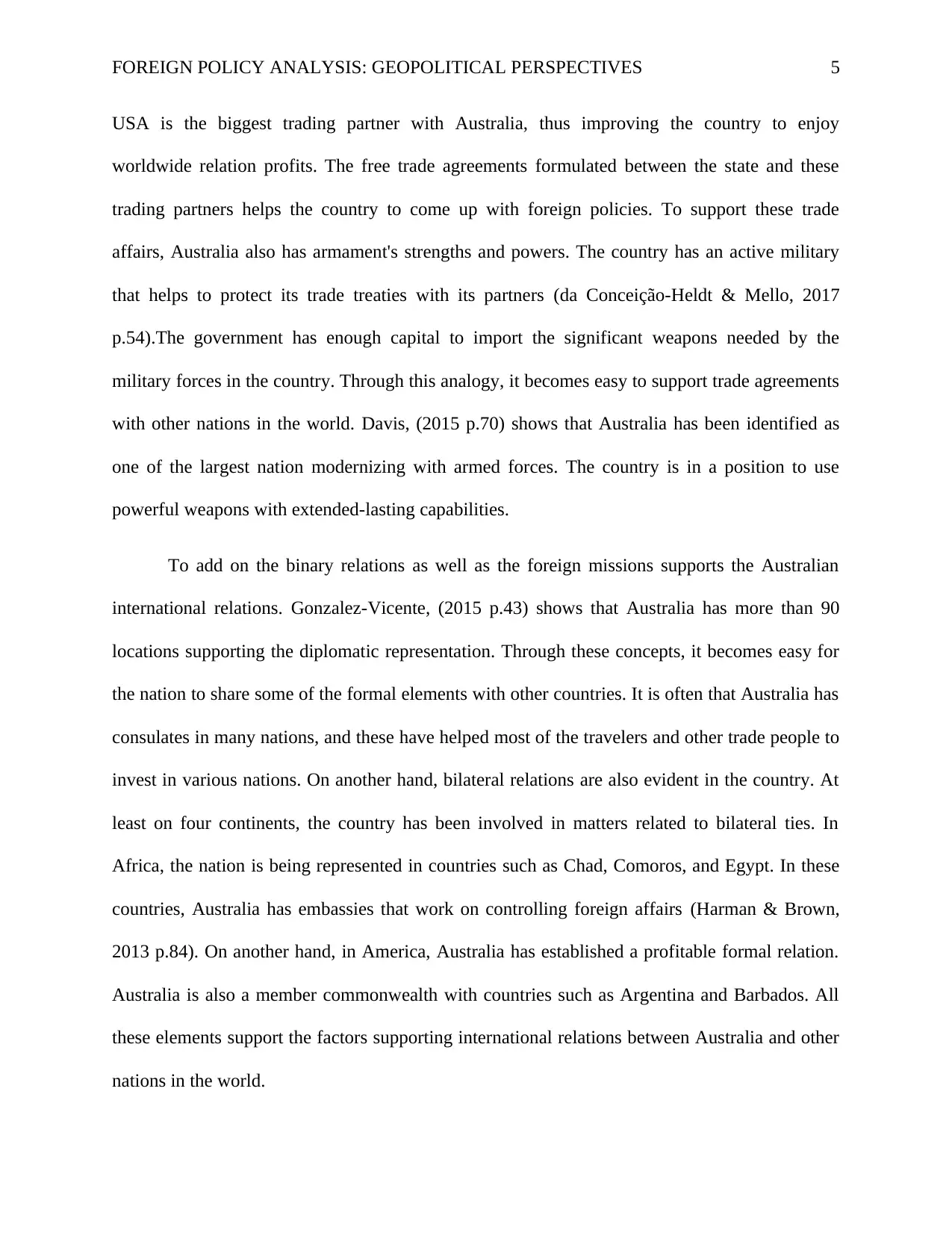
FOREIGN POLICY ANALYSIS: GEOPOLITICAL PERSPECTIVES 5
USA is the biggest trading partner with Australia, thus improving the country to enjoy
worldwide relation profits. The free trade agreements formulated between the state and these
trading partners helps the country to come up with foreign policies. To support these trade
affairs, Australia also has armament's strengths and powers. The country has an active military
that helps to protect its trade treaties with its partners (da Conceição-Heldt & Mello, 2017
p.54).The government has enough capital to import the significant weapons needed by the
military forces in the country. Through this analogy, it becomes easy to support trade agreements
with other nations in the world. Davis, (2015 p.70) shows that Australia has been identified as
one of the largest nation modernizing with armed forces. The country is in a position to use
powerful weapons with extended-lasting capabilities.
To add on the binary relations as well as the foreign missions supports the Australian
international relations. Gonzalez-Vicente, (2015 p.43) shows that Australia has more than 90
locations supporting the diplomatic representation. Through these concepts, it becomes easy for
the nation to share some of the formal elements with other countries. It is often that Australia has
consulates in many nations, and these have helped most of the travelers and other trade people to
invest in various nations. On another hand, bilateral relations are also evident in the country. At
least on four continents, the country has been involved in matters related to bilateral ties. In
Africa, the nation is being represented in countries such as Chad, Comoros, and Egypt. In these
countries, Australia has embassies that work on controlling foreign affairs (Harman & Brown,
2013 p.84). On another hand, in America, Australia has established a profitable formal relation.
Australia is also a member commonwealth with countries such as Argentina and Barbados. All
these elements support the factors supporting international relations between Australia and other
nations in the world.
USA is the biggest trading partner with Australia, thus improving the country to enjoy
worldwide relation profits. The free trade agreements formulated between the state and these
trading partners helps the country to come up with foreign policies. To support these trade
affairs, Australia also has armament's strengths and powers. The country has an active military
that helps to protect its trade treaties with its partners (da Conceição-Heldt & Mello, 2017
p.54).The government has enough capital to import the significant weapons needed by the
military forces in the country. Through this analogy, it becomes easy to support trade agreements
with other nations in the world. Davis, (2015 p.70) shows that Australia has been identified as
one of the largest nation modernizing with armed forces. The country is in a position to use
powerful weapons with extended-lasting capabilities.
To add on the binary relations as well as the foreign missions supports the Australian
international relations. Gonzalez-Vicente, (2015 p.43) shows that Australia has more than 90
locations supporting the diplomatic representation. Through these concepts, it becomes easy for
the nation to share some of the formal elements with other countries. It is often that Australia has
consulates in many nations, and these have helped most of the travelers and other trade people to
invest in various nations. On another hand, bilateral relations are also evident in the country. At
least on four continents, the country has been involved in matters related to bilateral ties. In
Africa, the nation is being represented in countries such as Chad, Comoros, and Egypt. In these
countries, Australia has embassies that work on controlling foreign affairs (Harman & Brown,
2013 p.84). On another hand, in America, Australia has established a profitable formal relation.
Australia is also a member commonwealth with countries such as Argentina and Barbados. All
these elements support the factors supporting international relations between Australia and other
nations in the world.
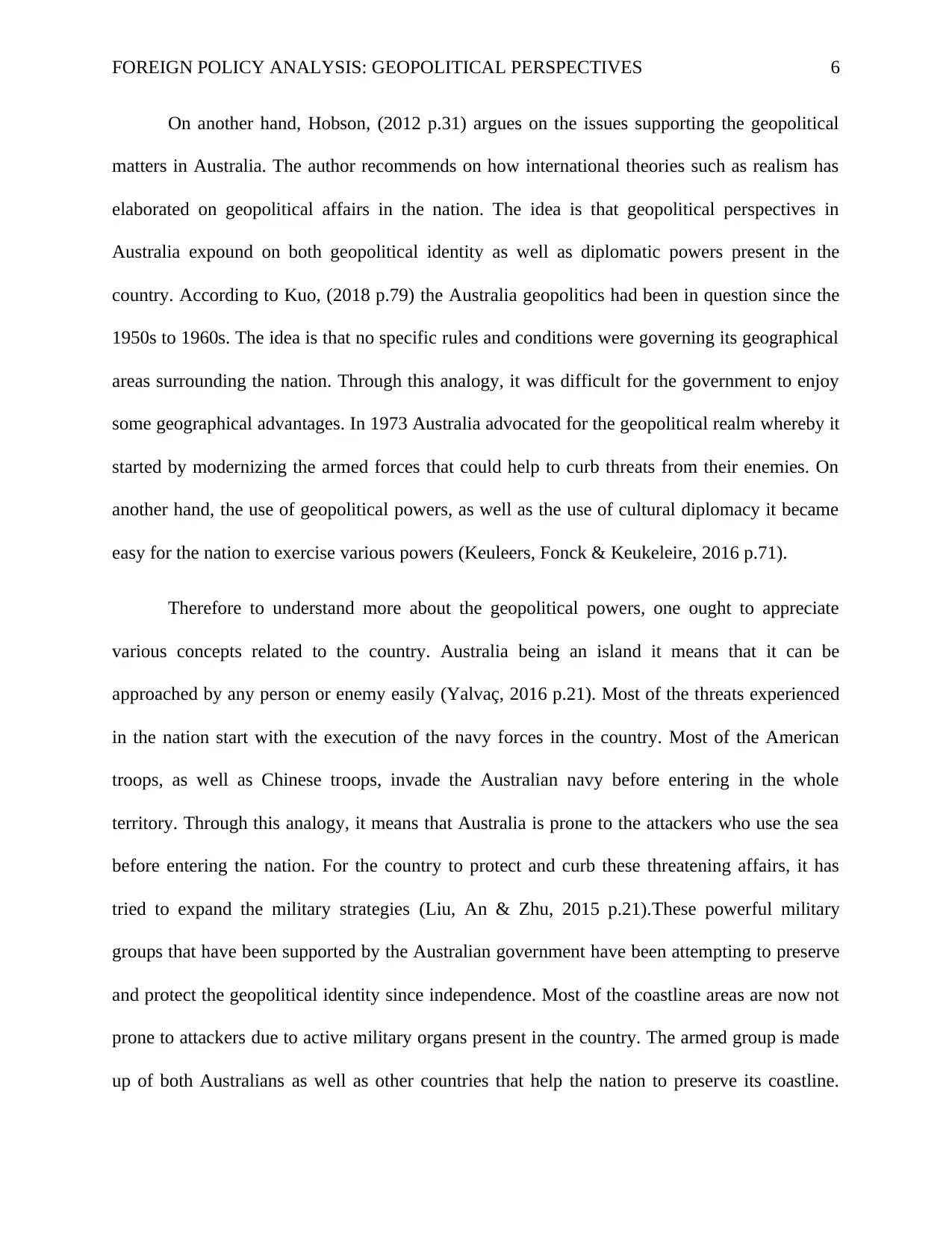
FOREIGN POLICY ANALYSIS: GEOPOLITICAL PERSPECTIVES 6
On another hand, Hobson, (2012 p.31) argues on the issues supporting the geopolitical
matters in Australia. The author recommends on how international theories such as realism has
elaborated on geopolitical affairs in the nation. The idea is that geopolitical perspectives in
Australia expound on both geopolitical identity as well as diplomatic powers present in the
country. According to Kuo, (2018 p.79) the Australia geopolitics had been in question since the
1950s to 1960s. The idea is that no specific rules and conditions were governing its geographical
areas surrounding the nation. Through this analogy, it was difficult for the government to enjoy
some geographical advantages. In 1973 Australia advocated for the geopolitical realm whereby it
started by modernizing the armed forces that could help to curb threats from their enemies. On
another hand, the use of geopolitical powers, as well as the use of cultural diplomacy it became
easy for the nation to exercise various powers (Keuleers, Fonck & Keukeleire, 2016 p.71).
Therefore to understand more about the geopolitical powers, one ought to appreciate
various concepts related to the country. Australia being an island it means that it can be
approached by any person or enemy easily (Yalvaç, 2016 p.21). Most of the threats experienced
in the nation start with the execution of the navy forces in the country. Most of the American
troops, as well as Chinese troops, invade the Australian navy before entering in the whole
territory. Through this analogy, it means that Australia is prone to the attackers who use the sea
before entering the nation. For the country to protect and curb these threatening affairs, it has
tried to expand the military strategies (Liu, An & Zhu, 2015 p.21).These powerful military
groups that have been supported by the Australian government have been attempting to preserve
and protect the geopolitical identity since independence. Most of the coastline areas are now not
prone to attackers due to active military organs present in the country. The armed group is made
up of both Australians as well as other countries that help the nation to preserve its coastline.
On another hand, Hobson, (2012 p.31) argues on the issues supporting the geopolitical
matters in Australia. The author recommends on how international theories such as realism has
elaborated on geopolitical affairs in the nation. The idea is that geopolitical perspectives in
Australia expound on both geopolitical identity as well as diplomatic powers present in the
country. According to Kuo, (2018 p.79) the Australia geopolitics had been in question since the
1950s to 1960s. The idea is that no specific rules and conditions were governing its geographical
areas surrounding the nation. Through this analogy, it was difficult for the government to enjoy
some geographical advantages. In 1973 Australia advocated for the geopolitical realm whereby it
started by modernizing the armed forces that could help to curb threats from their enemies. On
another hand, the use of geopolitical powers, as well as the use of cultural diplomacy it became
easy for the nation to exercise various powers (Keuleers, Fonck & Keukeleire, 2016 p.71).
Therefore to understand more about the geopolitical powers, one ought to appreciate
various concepts related to the country. Australia being an island it means that it can be
approached by any person or enemy easily (Yalvaç, 2016 p.21). Most of the threats experienced
in the nation start with the execution of the navy forces in the country. Most of the American
troops, as well as Chinese troops, invade the Australian navy before entering in the whole
territory. Through this analogy, it means that Australia is prone to the attackers who use the sea
before entering the nation. For the country to protect and curb these threatening affairs, it has
tried to expand the military strategies (Liu, An & Zhu, 2015 p.21).These powerful military
groups that have been supported by the Australian government have been attempting to preserve
and protect the geopolitical identity since independence. Most of the coastline areas are now not
prone to attackers due to active military organs present in the country. The armed group is made
up of both Australians as well as other countries that help the nation to preserve its coastline.
⊘ This is a preview!⊘
Do you want full access?
Subscribe today to unlock all pages.

Trusted by 1+ million students worldwide
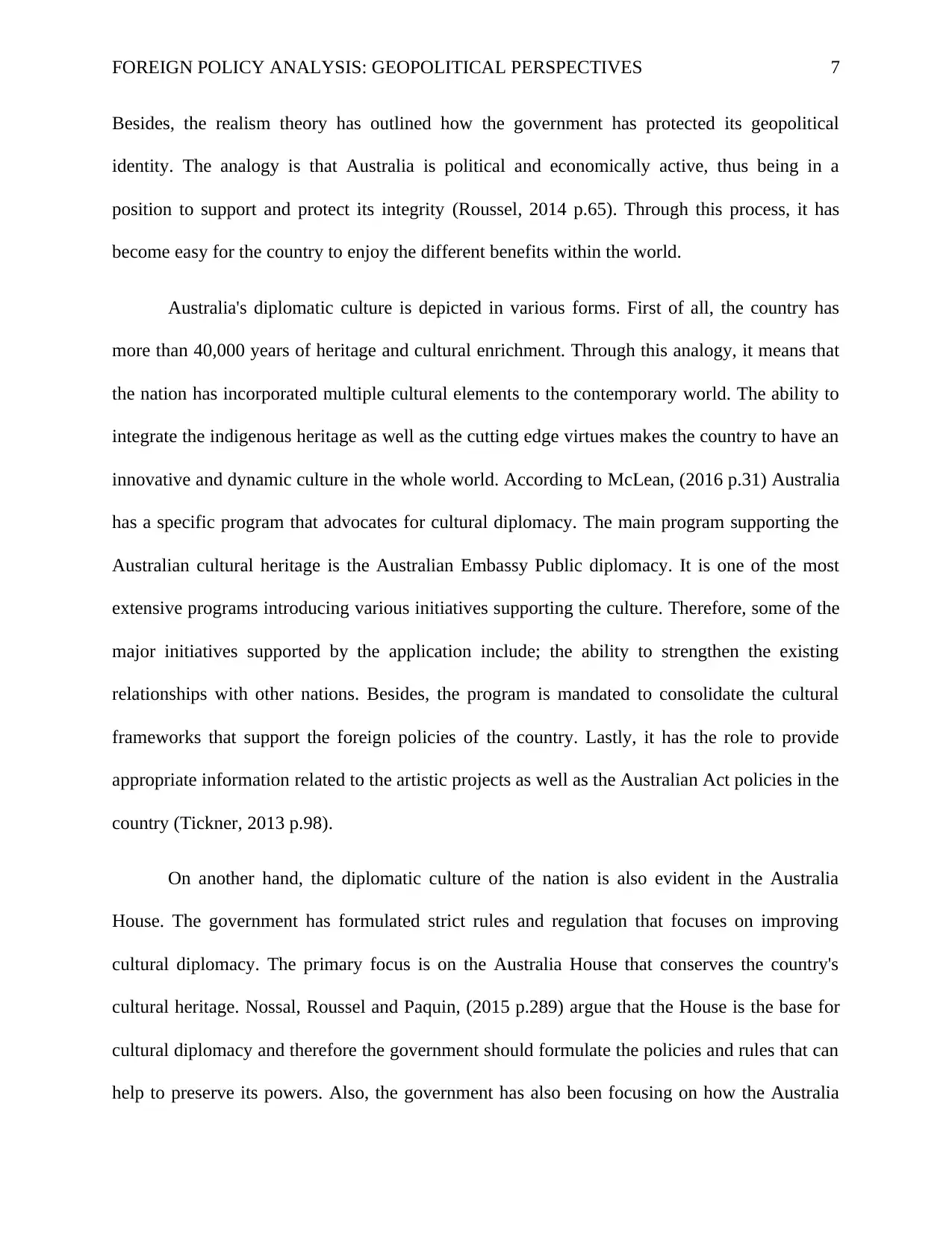
FOREIGN POLICY ANALYSIS: GEOPOLITICAL PERSPECTIVES 7
Besides, the realism theory has outlined how the government has protected its geopolitical
identity. The analogy is that Australia is political and economically active, thus being in a
position to support and protect its integrity (Roussel, 2014 p.65). Through this process, it has
become easy for the country to enjoy the different benefits within the world.
Australia's diplomatic culture is depicted in various forms. First of all, the country has
more than 40,000 years of heritage and cultural enrichment. Through this analogy, it means that
the nation has incorporated multiple cultural elements to the contemporary world. The ability to
integrate the indigenous heritage as well as the cutting edge virtues makes the country to have an
innovative and dynamic culture in the whole world. According to McLean, (2016 p.31) Australia
has a specific program that advocates for cultural diplomacy. The main program supporting the
Australian cultural heritage is the Australian Embassy Public diplomacy. It is one of the most
extensive programs introducing various initiatives supporting the culture. Therefore, some of the
major initiatives supported by the application include; the ability to strengthen the existing
relationships with other nations. Besides, the program is mandated to consolidate the cultural
frameworks that support the foreign policies of the country. Lastly, it has the role to provide
appropriate information related to the artistic projects as well as the Australian Act policies in the
country (Tickner, 2013 p.98).
On another hand, the diplomatic culture of the nation is also evident in the Australia
House. The government has formulated strict rules and regulation that focuses on improving
cultural diplomacy. The primary focus is on the Australia House that conserves the country's
cultural heritage. Nossal, Roussel and Paquin, (2015 p.289) argue that the House is the base for
cultural diplomacy and therefore the government should formulate the policies and rules that can
help to preserve its powers. Also, the government has also been focusing on how the Australia
Besides, the realism theory has outlined how the government has protected its geopolitical
identity. The analogy is that Australia is political and economically active, thus being in a
position to support and protect its integrity (Roussel, 2014 p.65). Through this process, it has
become easy for the country to enjoy the different benefits within the world.
Australia's diplomatic culture is depicted in various forms. First of all, the country has
more than 40,000 years of heritage and cultural enrichment. Through this analogy, it means that
the nation has incorporated multiple cultural elements to the contemporary world. The ability to
integrate the indigenous heritage as well as the cutting edge virtues makes the country to have an
innovative and dynamic culture in the whole world. According to McLean, (2016 p.31) Australia
has a specific program that advocates for cultural diplomacy. The main program supporting the
Australian cultural heritage is the Australian Embassy Public diplomacy. It is one of the most
extensive programs introducing various initiatives supporting the culture. Therefore, some of the
major initiatives supported by the application include; the ability to strengthen the existing
relationships with other nations. Besides, the program is mandated to consolidate the cultural
frameworks that support the foreign policies of the country. Lastly, it has the role to provide
appropriate information related to the artistic projects as well as the Australian Act policies in the
country (Tickner, 2013 p.98).
On another hand, the diplomatic culture of the nation is also evident in the Australia
House. The government has formulated strict rules and regulation that focuses on improving
cultural diplomacy. The primary focus is on the Australia House that conserves the country's
cultural heritage. Nossal, Roussel and Paquin, (2015 p.289) argue that the House is the base for
cultural diplomacy and therefore the government should formulate the policies and rules that can
help to preserve its powers. Also, the government has also been focusing on how the Australia
Paraphrase This Document
Need a fresh take? Get an instant paraphrase of this document with our AI Paraphraser
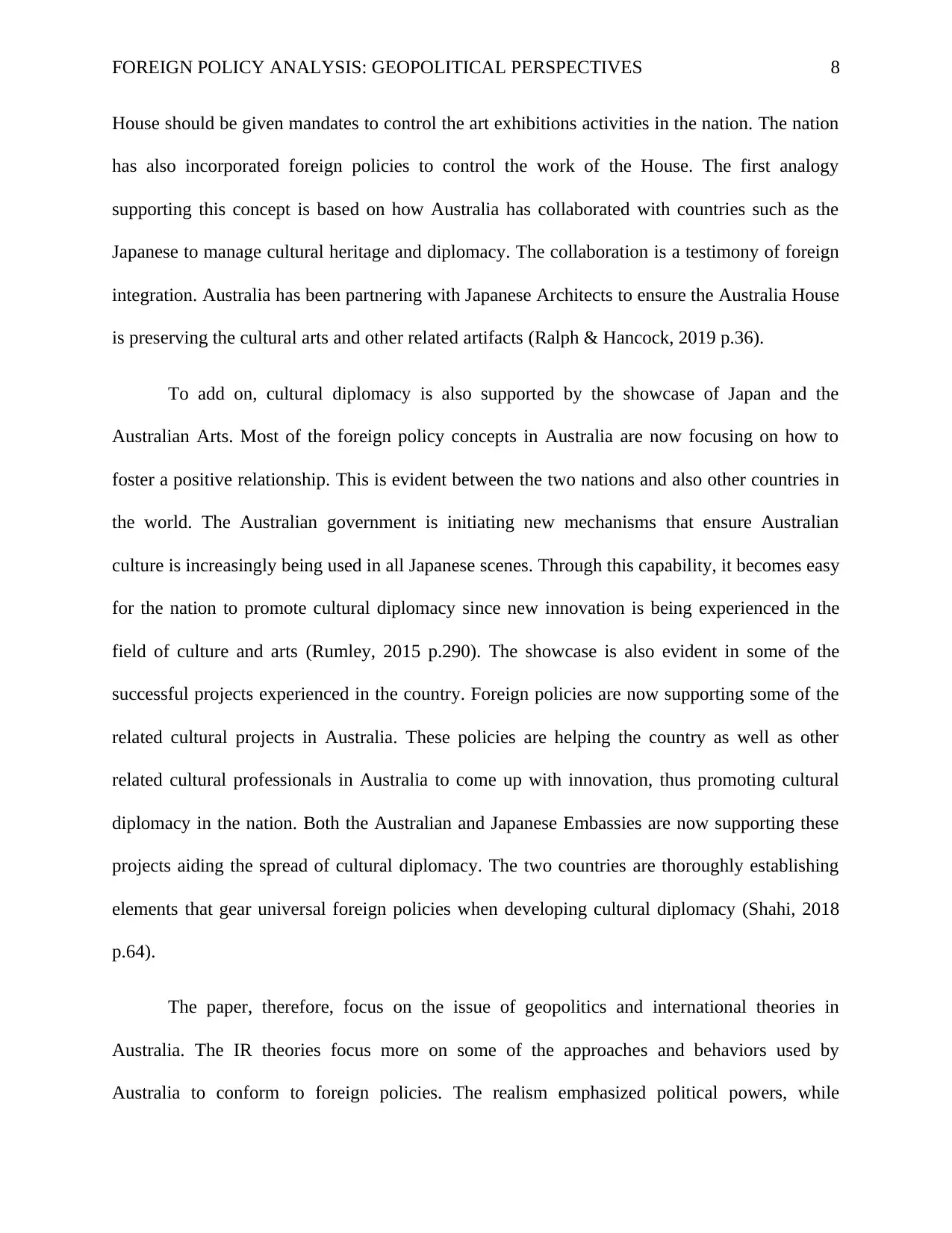
FOREIGN POLICY ANALYSIS: GEOPOLITICAL PERSPECTIVES 8
House should be given mandates to control the art exhibitions activities in the nation. The nation
has also incorporated foreign policies to control the work of the House. The first analogy
supporting this concept is based on how Australia has collaborated with countries such as the
Japanese to manage cultural heritage and diplomacy. The collaboration is a testimony of foreign
integration. Australia has been partnering with Japanese Architects to ensure the Australia House
is preserving the cultural arts and other related artifacts (Ralph & Hancock, 2019 p.36).
To add on, cultural diplomacy is also supported by the showcase of Japan and the
Australian Arts. Most of the foreign policy concepts in Australia are now focusing on how to
foster a positive relationship. This is evident between the two nations and also other countries in
the world. The Australian government is initiating new mechanisms that ensure Australian
culture is increasingly being used in all Japanese scenes. Through this capability, it becomes easy
for the nation to promote cultural diplomacy since new innovation is being experienced in the
field of culture and arts (Rumley, 2015 p.290). The showcase is also evident in some of the
successful projects experienced in the country. Foreign policies are now supporting some of the
related cultural projects in Australia. These policies are helping the country as well as other
related cultural professionals in Australia to come up with innovation, thus promoting cultural
diplomacy in the nation. Both the Australian and Japanese Embassies are now supporting these
projects aiding the spread of cultural diplomacy. The two countries are thoroughly establishing
elements that gear universal foreign policies when developing cultural diplomacy (Shahi, 2018
p.64).
The paper, therefore, focus on the issue of geopolitics and international theories in
Australia. The IR theories focus more on some of the approaches and behaviors used by
Australia to conform to foreign policies. The realism emphasized political powers, while
House should be given mandates to control the art exhibitions activities in the nation. The nation
has also incorporated foreign policies to control the work of the House. The first analogy
supporting this concept is based on how Australia has collaborated with countries such as the
Japanese to manage cultural heritage and diplomacy. The collaboration is a testimony of foreign
integration. Australia has been partnering with Japanese Architects to ensure the Australia House
is preserving the cultural arts and other related artifacts (Ralph & Hancock, 2019 p.36).
To add on, cultural diplomacy is also supported by the showcase of Japan and the
Australian Arts. Most of the foreign policy concepts in Australia are now focusing on how to
foster a positive relationship. This is evident between the two nations and also other countries in
the world. The Australian government is initiating new mechanisms that ensure Australian
culture is increasingly being used in all Japanese scenes. Through this capability, it becomes easy
for the nation to promote cultural diplomacy since new innovation is being experienced in the
field of culture and arts (Rumley, 2015 p.290). The showcase is also evident in some of the
successful projects experienced in the country. Foreign policies are now supporting some of the
related cultural projects in Australia. These policies are helping the country as well as other
related cultural professionals in Australia to come up with innovation, thus promoting cultural
diplomacy in the nation. Both the Australian and Japanese Embassies are now supporting these
projects aiding the spread of cultural diplomacy. The two countries are thoroughly establishing
elements that gear universal foreign policies when developing cultural diplomacy (Shahi, 2018
p.64).
The paper, therefore, focus on the issue of geopolitics and international theories in
Australia. The IR theories focus more on some of the approaches and behaviors used by
Australia to conform to foreign policies. The realism emphasized political powers, while
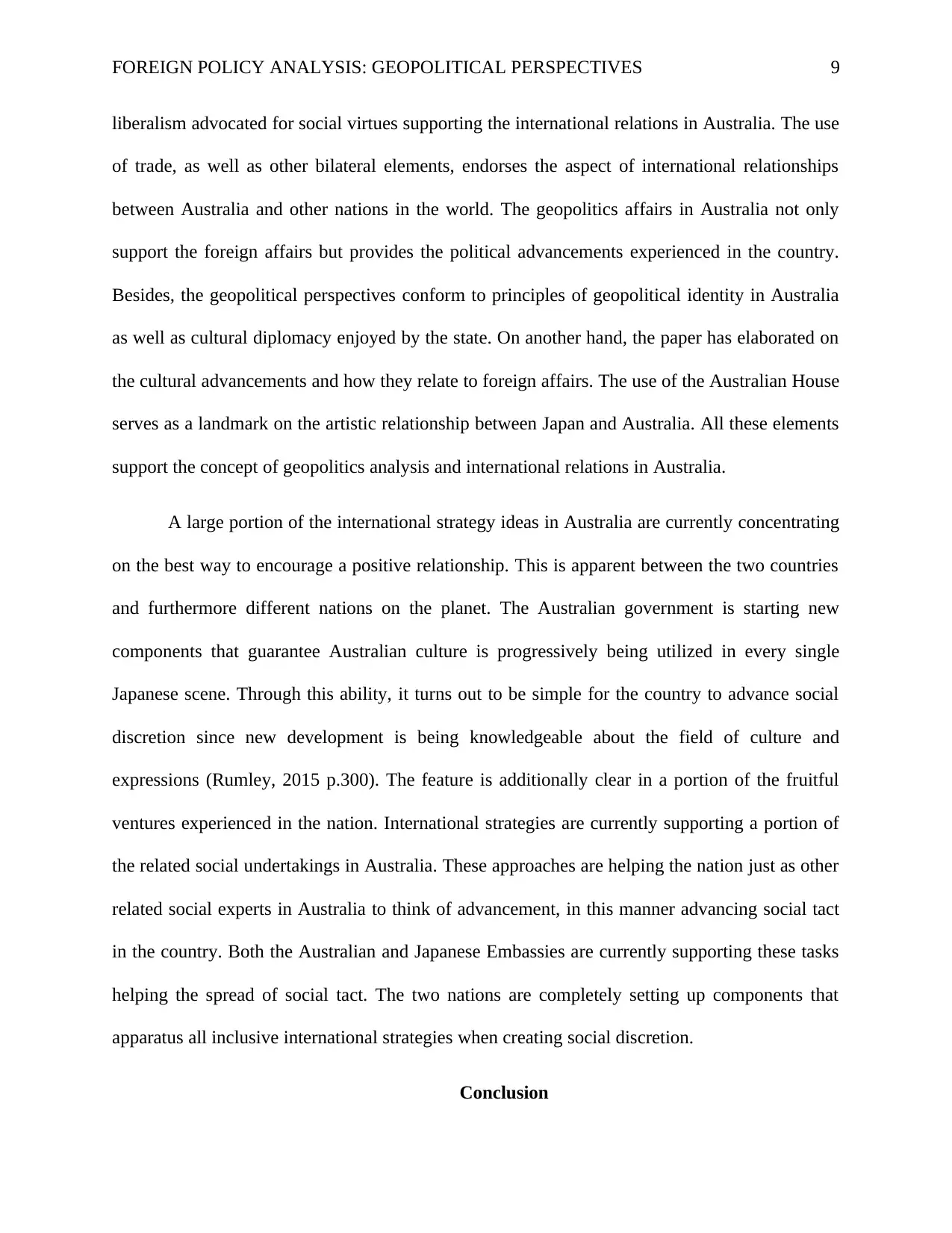
FOREIGN POLICY ANALYSIS: GEOPOLITICAL PERSPECTIVES 9
liberalism advocated for social virtues supporting the international relations in Australia. The use
of trade, as well as other bilateral elements, endorses the aspect of international relationships
between Australia and other nations in the world. The geopolitics affairs in Australia not only
support the foreign affairs but provides the political advancements experienced in the country.
Besides, the geopolitical perspectives conform to principles of geopolitical identity in Australia
as well as cultural diplomacy enjoyed by the state. On another hand, the paper has elaborated on
the cultural advancements and how they relate to foreign affairs. The use of the Australian House
serves as a landmark on the artistic relationship between Japan and Australia. All these elements
support the concept of geopolitics analysis and international relations in Australia.
A large portion of the international strategy ideas in Australia are currently concentrating
on the best way to encourage a positive relationship. This is apparent between the two countries
and furthermore different nations on the planet. The Australian government is starting new
components that guarantee Australian culture is progressively being utilized in every single
Japanese scene. Through this ability, it turns out to be simple for the country to advance social
discretion since new development is being knowledgeable about the field of culture and
expressions (Rumley, 2015 p.300). The feature is additionally clear in a portion of the fruitful
ventures experienced in the nation. International strategies are currently supporting a portion of
the related social undertakings in Australia. These approaches are helping the nation just as other
related social experts in Australia to think of advancement, in this manner advancing social tact
in the country. Both the Australian and Japanese Embassies are currently supporting these tasks
helping the spread of social tact. The two nations are completely setting up components that
apparatus all inclusive international strategies when creating social discretion.
Conclusion
liberalism advocated for social virtues supporting the international relations in Australia. The use
of trade, as well as other bilateral elements, endorses the aspect of international relationships
between Australia and other nations in the world. The geopolitics affairs in Australia not only
support the foreign affairs but provides the political advancements experienced in the country.
Besides, the geopolitical perspectives conform to principles of geopolitical identity in Australia
as well as cultural diplomacy enjoyed by the state. On another hand, the paper has elaborated on
the cultural advancements and how they relate to foreign affairs. The use of the Australian House
serves as a landmark on the artistic relationship between Japan and Australia. All these elements
support the concept of geopolitics analysis and international relations in Australia.
A large portion of the international strategy ideas in Australia are currently concentrating
on the best way to encourage a positive relationship. This is apparent between the two countries
and furthermore different nations on the planet. The Australian government is starting new
components that guarantee Australian culture is progressively being utilized in every single
Japanese scene. Through this ability, it turns out to be simple for the country to advance social
discretion since new development is being knowledgeable about the field of culture and
expressions (Rumley, 2015 p.300). The feature is additionally clear in a portion of the fruitful
ventures experienced in the nation. International strategies are currently supporting a portion of
the related social undertakings in Australia. These approaches are helping the nation just as other
related social experts in Australia to think of advancement, in this manner advancing social tact
in the country. Both the Australian and Japanese Embassies are currently supporting these tasks
helping the spread of social tact. The two nations are completely setting up components that
apparatus all inclusive international strategies when creating social discretion.
Conclusion
⊘ This is a preview!⊘
Do you want full access?
Subscribe today to unlock all pages.

Trusted by 1+ million students worldwide
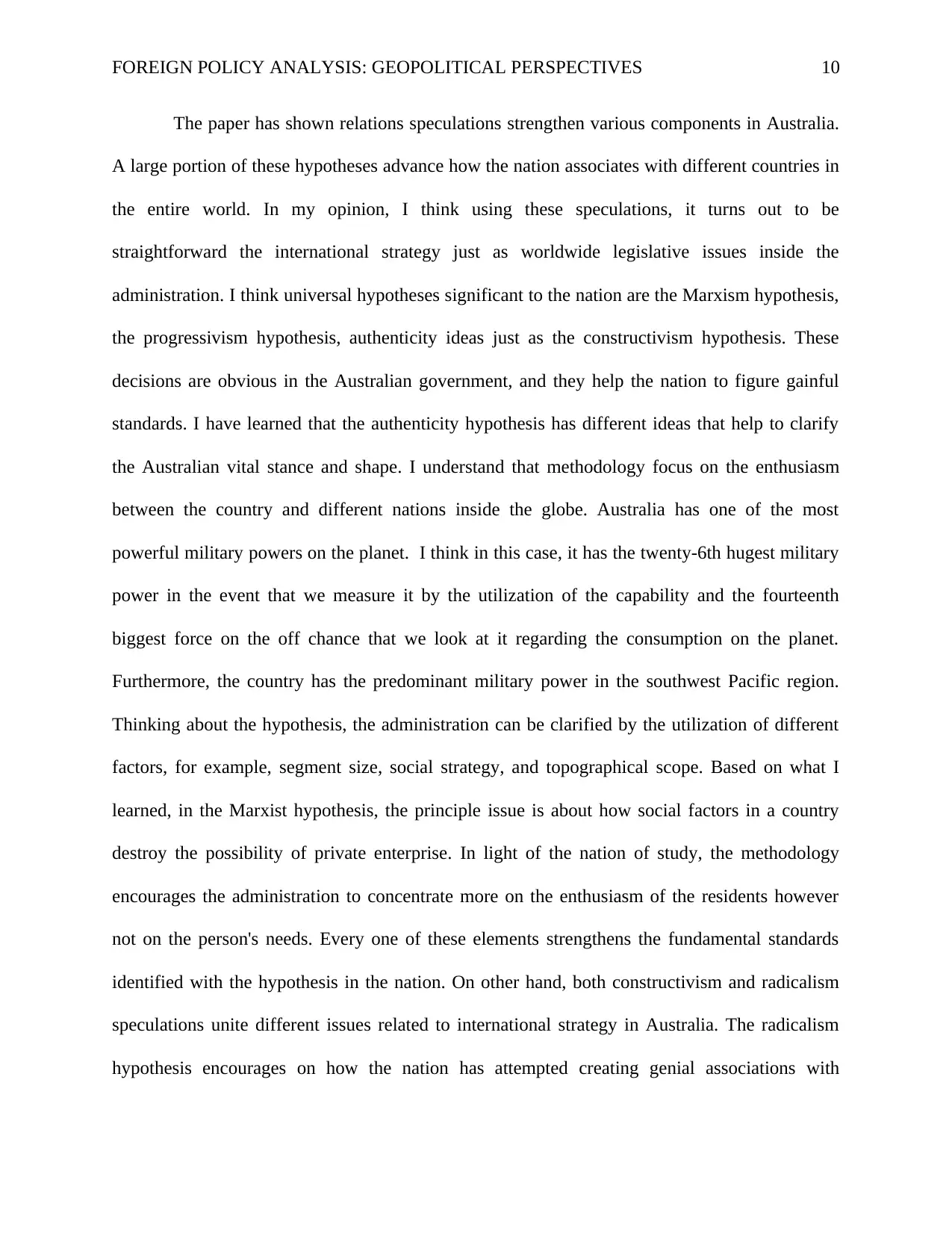
FOREIGN POLICY ANALYSIS: GEOPOLITICAL PERSPECTIVES 10
The paper has shown relations speculations strengthen various components in Australia.
A large portion of these hypotheses advance how the nation associates with different countries in
the entire world. In my opinion, I think using these speculations, it turns out to be
straightforward the international strategy just as worldwide legislative issues inside the
administration. I think universal hypotheses significant to the nation are the Marxism hypothesis,
the progressivism hypothesis, authenticity ideas just as the constructivism hypothesis. These
decisions are obvious in the Australian government, and they help the nation to figure gainful
standards. I have learned that the authenticity hypothesis has different ideas that help to clarify
the Australian vital stance and shape. I understand that methodology focus on the enthusiasm
between the country and different nations inside the globe. Australia has one of the most
powerful military powers on the planet. I think in this case, it has the twenty-6th hugest military
power in the event that we measure it by the utilization of the capability and the fourteenth
biggest force on the off chance that we look at it regarding the consumption on the planet.
Furthermore, the country has the predominant military power in the southwest Pacific region.
Thinking about the hypothesis, the administration can be clarified by the utilization of different
factors, for example, segment size, social strategy, and topographical scope. Based on what I
learned, in the Marxist hypothesis, the principle issue is about how social factors in a country
destroy the possibility of private enterprise. In light of the nation of study, the methodology
encourages the administration to concentrate more on the enthusiasm of the residents however
not on the person's needs. Every one of these elements strengthens the fundamental standards
identified with the hypothesis in the nation. On other hand, both constructivism and radicalism
speculations unite different issues related to international strategy in Australia. The radicalism
hypothesis encourages on how the nation has attempted creating genial associations with
The paper has shown relations speculations strengthen various components in Australia.
A large portion of these hypotheses advance how the nation associates with different countries in
the entire world. In my opinion, I think using these speculations, it turns out to be
straightforward the international strategy just as worldwide legislative issues inside the
administration. I think universal hypotheses significant to the nation are the Marxism hypothesis,
the progressivism hypothesis, authenticity ideas just as the constructivism hypothesis. These
decisions are obvious in the Australian government, and they help the nation to figure gainful
standards. I have learned that the authenticity hypothesis has different ideas that help to clarify
the Australian vital stance and shape. I understand that methodology focus on the enthusiasm
between the country and different nations inside the globe. Australia has one of the most
powerful military powers on the planet. I think in this case, it has the twenty-6th hugest military
power in the event that we measure it by the utilization of the capability and the fourteenth
biggest force on the off chance that we look at it regarding the consumption on the planet.
Furthermore, the country has the predominant military power in the southwest Pacific region.
Thinking about the hypothesis, the administration can be clarified by the utilization of different
factors, for example, segment size, social strategy, and topographical scope. Based on what I
learned, in the Marxist hypothesis, the principle issue is about how social factors in a country
destroy the possibility of private enterprise. In light of the nation of study, the methodology
encourages the administration to concentrate more on the enthusiasm of the residents however
not on the person's needs. Every one of these elements strengthens the fundamental standards
identified with the hypothesis in the nation. On other hand, both constructivism and radicalism
speculations unite different issues related to international strategy in Australia. The radicalism
hypothesis encourages on how the nation has attempted creating genial associations with
Paraphrase This Document
Need a fresh take? Get an instant paraphrase of this document with our AI Paraphraser
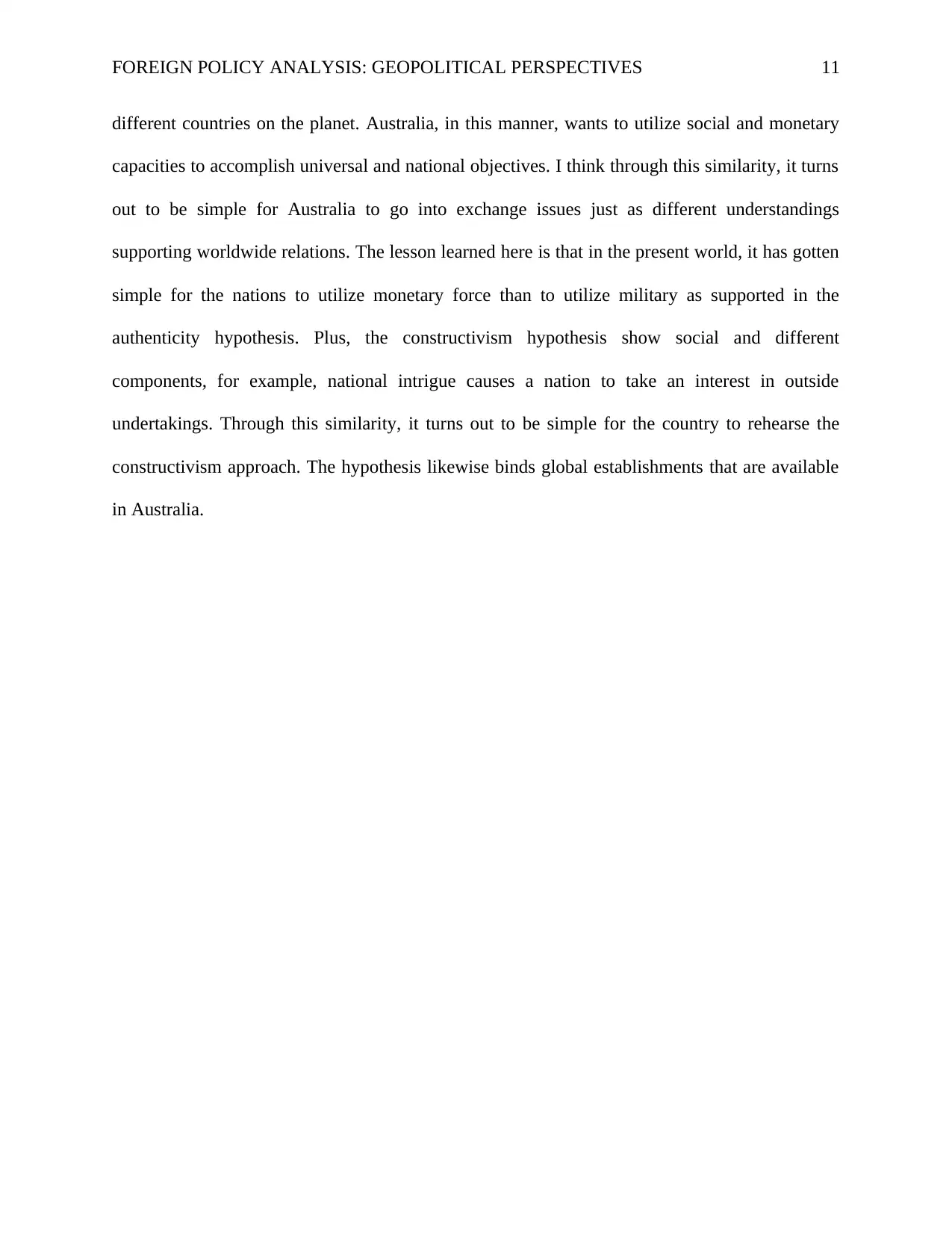
FOREIGN POLICY ANALYSIS: GEOPOLITICAL PERSPECTIVES 11
different countries on the planet. Australia, in this manner, wants to utilize social and monetary
capacities to accomplish universal and national objectives. I think through this similarity, it turns
out to be simple for Australia to go into exchange issues just as different understandings
supporting worldwide relations. The lesson learned here is that in the present world, it has gotten
simple for the nations to utilize monetary force than to utilize military as supported in the
authenticity hypothesis. Plus, the constructivism hypothesis show social and different
components, for example, national intrigue causes a nation to take an interest in outside
undertakings. Through this similarity, it turns out to be simple for the country to rehearse the
constructivism approach. The hypothesis likewise binds global establishments that are available
in Australia.
different countries on the planet. Australia, in this manner, wants to utilize social and monetary
capacities to accomplish universal and national objectives. I think through this similarity, it turns
out to be simple for Australia to go into exchange issues just as different understandings
supporting worldwide relations. The lesson learned here is that in the present world, it has gotten
simple for the nations to utilize monetary force than to utilize military as supported in the
authenticity hypothesis. Plus, the constructivism hypothesis show social and different
components, for example, national intrigue causes a nation to take an interest in outside
undertakings. Through this similarity, it turns out to be simple for the country to rehearse the
constructivism approach. The hypothesis likewise binds global establishments that are available
in Australia.
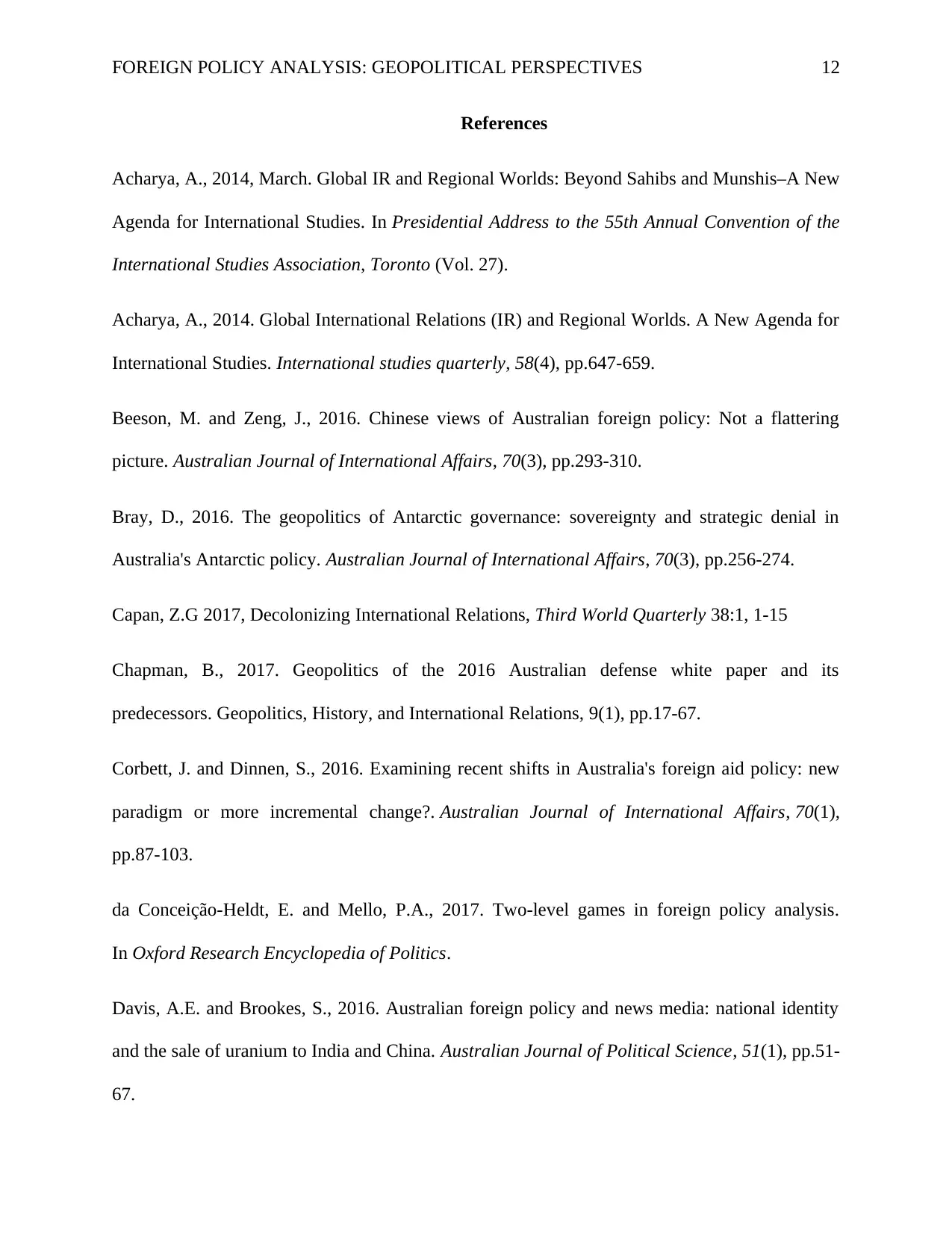
FOREIGN POLICY ANALYSIS: GEOPOLITICAL PERSPECTIVES 12
References
Acharya, A., 2014, March. Global IR and Regional Worlds: Beyond Sahibs and Munshis–A New
Agenda for International Studies. In Presidential Address to the 55th Annual Convention of the
International Studies Association, Toronto (Vol. 27).
Acharya, A., 2014. Global International Relations (IR) and Regional Worlds. A New Agenda for
International Studies. International studies quarterly, 58(4), pp.647-659.
Beeson, M. and Zeng, J., 2016. Chinese views of Australian foreign policy: Not a flattering
picture. Australian Journal of International Affairs, 70(3), pp.293-310.
Bray, D., 2016. The geopolitics of Antarctic governance: sovereignty and strategic denial in
Australia's Antarctic policy. Australian Journal of International Affairs, 70(3), pp.256-274.
Capan, Z.G 2017, Decolonizing International Relations, Third World Quarterly 38:1, 1-15
Chapman, B., 2017. Geopolitics of the 2016 Australian defense white paper and its
predecessors. Geopolitics, History, and International Relations, 9(1), pp.17-67.
Corbett, J. and Dinnen, S., 2016. Examining recent shifts in Australia's foreign aid policy: new
paradigm or more incremental change?. Australian Journal of International Affairs, 70(1),
pp.87-103.
da Conceição-Heldt, E. and Mello, P.A., 2017. Two-level games in foreign policy analysis.
In Oxford Research Encyclopedia of Politics.
Davis, A.E. and Brookes, S., 2016. Australian foreign policy and news media: national identity
and the sale of uranium to India and China. Australian Journal of Political Science, 51(1), pp.51-
67.
References
Acharya, A., 2014, March. Global IR and Regional Worlds: Beyond Sahibs and Munshis–A New
Agenda for International Studies. In Presidential Address to the 55th Annual Convention of the
International Studies Association, Toronto (Vol. 27).
Acharya, A., 2014. Global International Relations (IR) and Regional Worlds. A New Agenda for
International Studies. International studies quarterly, 58(4), pp.647-659.
Beeson, M. and Zeng, J., 2016. Chinese views of Australian foreign policy: Not a flattering
picture. Australian Journal of International Affairs, 70(3), pp.293-310.
Bray, D., 2016. The geopolitics of Antarctic governance: sovereignty and strategic denial in
Australia's Antarctic policy. Australian Journal of International Affairs, 70(3), pp.256-274.
Capan, Z.G 2017, Decolonizing International Relations, Third World Quarterly 38:1, 1-15
Chapman, B., 2017. Geopolitics of the 2016 Australian defense white paper and its
predecessors. Geopolitics, History, and International Relations, 9(1), pp.17-67.
Corbett, J. and Dinnen, S., 2016. Examining recent shifts in Australia's foreign aid policy: new
paradigm or more incremental change?. Australian Journal of International Affairs, 70(1),
pp.87-103.
da Conceição-Heldt, E. and Mello, P.A., 2017. Two-level games in foreign policy analysis.
In Oxford Research Encyclopedia of Politics.
Davis, A.E. and Brookes, S., 2016. Australian foreign policy and news media: national identity
and the sale of uranium to India and China. Australian Journal of Political Science, 51(1), pp.51-
67.
⊘ This is a preview!⊘
Do you want full access?
Subscribe today to unlock all pages.

Trusted by 1+ million students worldwide
1 out of 14
Related Documents
Your All-in-One AI-Powered Toolkit for Academic Success.
+13062052269
info@desklib.com
Available 24*7 on WhatsApp / Email
![[object Object]](/_next/static/media/star-bottom.7253800d.svg)
Unlock your academic potential
Copyright © 2020–2026 A2Z Services. All Rights Reserved. Developed and managed by ZUCOL.





